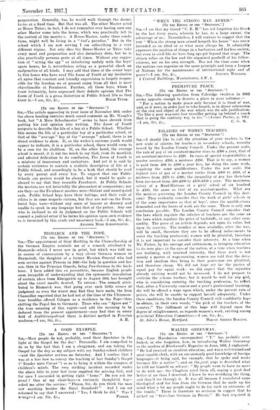[To THE EDITOR or THE SPECTATOR. - ] Slit,—The article appearing iu
your issue of November lOth under the above heading contains much sound comment on Mr. Waugh's book, but "A Mere Schoolmaster" seems to have shrunk from putting his real opinion into writing. The Loom of Youth Purports to describe the life of a boy at a Public School. Whether this means the life of a particular boy at a particular school, or that of the "average" boy at the "average" school, there is no direct evidence to show. If, as the writer's extreme youth would appear to indicate, it is a particular school, there would seem to be a case for its abolition. If, on the other hand, the average school is meant, it is not too much to say that, from its mawkish and affected dedication to its conclusion, The Loom of Youth is a mixture of issaccurncy and caricature. And yet it is mid by certain reviewers to contain a realistic description of life at a Public School, and accordingly to be a book that should be read by every parent and every .bay. To suggest that our Public Schools are perfect would Abe absurd, but it would lee quite as absurd to say that they resemble Fernhurst. At Public Schools the masters are not invariably the pleasantest of companions; our are they—as the Fernhurst masters were—blatant and unmitigated cads. Public School boys have their failings, and their code of ethics is in some respects curious, but they are not—as the Fern- burst boys were—without any sense of honour or decency and unable to speak in any language but that of the gutter. Any one who is inclined to sit in judgment on the Public Schools will commit a judicial error if ho forms his opinion upon such evidence as is furnished by this crude and unsavoury book.—I am, Sir, Ac.,
ANOTHER MERE SCHOOLMASTER.














































 Previous page
Previous page